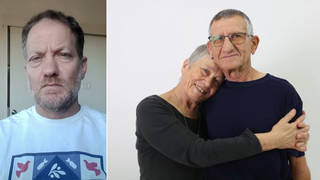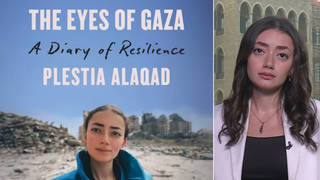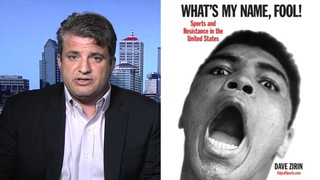
Guests
- Elizabeth Alexanderpoet and professor. She is director of Creativity and Free Expression at the Ford Foundation. She is the former chair of African American Studies at Yale. She is the author of the persona poem “Narrative: Ali,” written from the perspective of Muhammad Ali.
- Ishmael Reededucator, writer and activist. He is author of the book, The Complete Muhammad Ali, which was published last year. Reed is a 1998 recipient of the MacArthur “genius” award and is currently a visiting scholar at the California College of the Arts.
Links
Muhammad Ali, one of the most iconic figures of the 20th century, has died at the age of 74. Poet and professor Elizabeth Alexander reads her persona poem “Narrative: Ali,” written from Ali’s perspective.
Transcript
AMY GOODMAN: To talk more about the life and legacy of Muhammad Ali, we are turning to poet and professor Elizabeth Alexander, director of Creativity and Free Expression at the Ford Foundation, former chair of African American Studies at Yale University. She’s the author of the persona poem “Narrative: Ali,” written from the perspective of Muhammad Ali.
Welcome to Democracy Now!, Elizabeth Alexander. How did you get interested in Muhammad Ali?
ELIZABETH ALEXANDER: In the late 1980s, they started to show some of his great fights on, I think, probably, the Wide World of Sports, something like that. And I had never seen them. I had never watched this man in his physical magnificence and originality. I knew who he was, of course. I knew what he stood for. But to be able to sort of put together the whole package of physical expression and might along with his belief in the word and the medium of the word, along with all the things that he stood for and the way that he was able to be an iconic black man, and to project himself as a free black man in the world in so many different contexts, that captivated me. And then the mysterious thing of poetic process happened, which is I started to imagine and hear his voice and wanted to write in his voice. And so, out of that came a long poem, an epic poem, called “Narrative: Ali.”
AMY GOODMAN: Now, I want to warn people, in this poem, you use the N-word. Can you talk about your choice to do this?
ELIZABETH ALEXANDER: One of the things—excuse me—about writing in persona is that you want to have a kind of fidelity to your subject. You don’t want to veer outside of how you have researched or imagined that they might speak or their historical context. And so, that’s not a word that I throw around, but that is a word that’s used in two different contexts, both how he understood himself as a black person in America at a particular point in time and also how he talked about himself in a colloquial setting with another black man. So, it is how I researched and imagined he would have used that word, and to shy away from it felt disingenuous to the subject.
AMY GOODMAN: Why don’t you share your poem?
ELIZABETH ALEXANDER: Yes. And, you know, epic poems have heroes. I really appreciate so much all of the context that Ishmael Reed has given us, and it’s wonderful to be on the show with him. And I’m thinking about what sparks the imagination, I’m thinking about iconicity, I’m thinking about epic heroes in this poem.
“Narrative: Ali”
a poem in twelve rounds
1.
My head so big
they had to pry
me out. I’m sorry
Bird (is what I call
my mother). Cassius
Marcellus Clay,
Muhammad Ali;
you can say
my name in any
language, any
continent: Ali.
2.
Two photographs
of Emmett Till,
born my year,
on my birthday.
One, he’s smiling,
happy, and the other one
is after. His mother
did the bold thing,
kept the casket open,
made the thousands look upon
his bulging eyes,
his twisted neck,
her lynched black boy.
I couldn’t sleep
for thinking,
Emmett Till.
One day I went
Down to the train tracks,
found some iron
shoe-shine rests
and planted them
between the ties
and waited
for a train to come,
and watched the train
derail, and ran,
and after that
I slept at night.
3.
I need to train
around people,
hear them talk,
talk back. I need
to hear the traffic,
see people in
the barbershop,
people getting
shoe shines, talking,
hear them talk,
talk back.
4.
Bottom line: Olympic gold
can’t buy a black man
a Louisville hamburger
in nineteen-sixty.
Wasn’t even real gold.
I watched the river
drag the ribbon down,
red, white, and blue.
5.
Laying on the bed,
praying for a wife,
in walk Sonji Roi.
Pretty little shape.
Do you like
chop suey?
Can I wash your hair
underneath
that wig?
Lay on the bed,
Girl. Lie
with me.
Shake to the east,
to the north,
south, west—
but remember,
remember, I need
a Muslim wife. So
Quit using lipstick.
Quit your boogaloo.
Cover up your knees
like a Muslim
wife, religion,
religion, a Muslim
wife. Eleven
months with Sonji,
first woman I loved.
6.
There’s not
too many days
that pass that I
don’t think
of how it started,
but I know
no Great White Hope
can beat
a true black champ.
Jerry Quarry
could have been
a movie star,
a millionaire,
a senator,
a president—
he only had
to do one thing,
is whip me,
but he can’t.
7. Dressing-Room Visitor
He opened
up his shirt:
“KKK” cut
in his chest.
He dropped
his trousers:
latticed scars
where testicles
should be, His face
bewildered, frozen
in the Alabama woods
that night in 1966
when they left him
for dead, his testicles
in a Dixie cup.
You a warning,
they told him,
to smart-mouth,
sassy-acting niggers,
meaning niggers
still alive,
meaning any nigger,
meaning niggers
like me.
8. Training
Unsweetened grapefruit juice
will melt my stomach down.
Don’t drive if you can walk,
don’t walk if you can run.
I add a mile each day
and run in eight-pound boots.
My knuckles sometimes burst
the glove. I let dead skin
build up, and then I peel it,
let it scar, so I don’t bleed
as much. My bones
absorb the shock.
I train in three-minute
spurts, like rounds: three
rounds big bag, three speed
bag, three jump rope, one-
minute breaks,
no more, no less.
Am I too old? Eat only
kosher meat. Eat cabbage,
carrots, beets, and watch
the weight come down:
two-thirty, two-twenty,
two-ten, two-oh-nine.
9.
Will I go
like Kid Paret,
a fractured
skull, a ten-day
sleep, dreaming
alligators, pork
chops, saxophones,
slow grinds, funk,
fishbowls, lightbulbs,
bats, typewriters,
tuning forks, funk
clocks, red rubber
ball, what you see
in that lifetime
knockout minute
on the cusp?
You could be
let go,
you could be
snatched back.
10. Rumble in the Jungle
Ali boma ye,
Ali boma ye,
means kill him, Ali,
which is different
from a whupping
which is what I give,
but I lead them chanting
anyway, Ali
boma ye, because
here in Africa
black people fly
planes and run countries.
I’m still making up
for the foolishness
I said when I was
Clay from Louisville,
where I learned Africans
live naked in straw
huts eating tiger meat,
grunting and grinning,
swinging from vines,
pounding their chests—
I pound my chest but of my own accord.
11.
I said to Joe Frazier,
first thing, get a good house
in case you get crippled
so you and your family
can sleep somewhere. Always
keep one good Cadillac.
And watch how you dress
with that cowboy hat,
pink suits, white shoes—
that’s how pimps dress,
or kids, and you a champ,
or wish you were, ’cause
I can whip you in the ring
or whip you in the street.
Now back to clothes,
wear dark clothes, suits,
black suits, like you the best
at what you do, like you
President of the World.
Dress like that.
Put them yellow pants away.
We dinosaurs gotta
look good, gotta sound
good, gotta be good,
the greatest, that’s what
I told Joe Frazier,
and he said to me,
we both bad niggers.
We don’t do no crawlin’.
12.
They called me “the fistic pariah.”
They said I didn’t love my country,
called me a race-hater, called me out
of my name, waited for me
to come out on a stretcher, shot at me,
hexed me, cursed me, wished me
all manner of ill will,
told me I was finished.
Here I am,
like the song says,
come and take me,
“The People’s Champ,”
myself,
Muhammad.
AMY GOODMAN: That’s Elizabeth Alexander reading her poem “Narrative: Ali.” In fact, Muhammad Ali was not just the greatest boxer. He was not just an activist, a war resister. He was a poet, too.
ELIZABETH ALEXANDER: He was a poet, and he claimed himself as a poet. On the one hand, he spoke in ways that are very familiar in the African-American rhetorical tradition, with flourish, with a sense of rhythm, with a sense of rhyme, with a sense of occasion. But he brought that out for people to see in public. And when asked for a poem one time, he replied simply, “Me, we.” He understood poetic economy. He understood that in a very short, concentrated place, you could do big things. He understood that poetry was memorable. He understood that poetry belonged to everyone. He recorded an album in 1963, I think, of spoken word poetry. He consorted with poets. There’s an absolutely fantastic exchange visit that he had with Marianne Moore, when they decided to write a poem together, a sonnet, on the annihilation of Ernie Terrell. And George Plimpton brought them together and wrote about it, and it’s a wonderful account. So, I think that that was a consistent identity.
AMY GOODMAN: He’s the original rapper, hip-hop.
ELIZABETH ALEXANDER: Well, he was. And I think that what we see in that is the way that hip-hop and rap has very, very long and deep roots in black expressive culture.
AMY GOODMAN: I wanted to go back to Muhammad Ali in his own words, in 1968, interviewed on Channel 13, PBS, here in New York, by Bud Collins.
BUD COLLINS: What about jail? Now, you’re appealing. Is that correct?
MUHAMMAD ALI: Oh, yes, jail, that could come up. And if I should lose appeal, then I’ll have to go to jail. And I’ll be out of there in a few years.
BUD COLLINS: Have you thought about jail, what it might mean? Have you talked about people who have been in jail five years?
MUHAMMAD ALI: Well, well, we all talk about, the Honorable Elijah Muhammad, that black people actually have been in jail for 400 years we’ve been here in America. But I don’t worry about jail, if I believe in Allah, I believe in Elijah Muhammad as the messenger of God, and many a great men have to go to jail. And so, I don’t pay no attention to it. If the time comes, I’ll just have to go. Boys in Vietnam are dying for what they believe, and I can’t get on them for dying for what they believe. So I’ll just have to—and they’re dying to free foreign people 10,000 miles away, so I’ll just have to suffer so that the so-called Negroes could be free, so they could have an idol and an image they can look up to that didn’t sell them out, that didn’t betray them.
BUD COLLINS: Do you think you can do more for your people by going to jail?
MUHAMMAD ALI: Oh, yes, sir.
AMY GOODMAN: That was Muhammad Ali in ’68 being interviewed by Bud Collins, the journalist and tennis commentator. Bud also just died in March at the age of 86. Your dad, Elizabeth Alexander, was secretary of the Army, is that right?
ELIZABETH ALEXANDER: Yes.
AMY GOODMAN: And here is Muhammad Ali saying no to the war in Vietnam.
ELIZABETH ALEXANDER: Well, my dad says no to wars, too. So, I mean, we could have that whole conversation. But I think that, actually, since you bring him up, part of why Ali resonated for me is that he was a free black man in a way that my father is a free black man, and that taught me what I wanted to see in this world, what we need to see in this world. Muhammad Ali was imperfect, complicated. You know, what did it mean as a feminist writer to think about, you know, this is a man with a complicated history with women. This is a man working in a quintessentially male, physically expressive form. I’m very well aware of what class and race says about vulnerable bodies, what does it mean to make your body more vulnerable because that seems to be the way you can move in the world. All of those ironies are powerful ones.
But at the end of the day, there’s still someone who, as a very, very young man, as a very, very young man, met a juncture and said no and paid the price and stood for years for that and sacrificed that very thing that was his currency. And that’s what shines on: the power of self. Not very many of us are able to project that true, again, free self onto a world stage. So what we see in the work of other artists—I mean, you’ve been playing this amazing music—Yasiin Bey, so many people, other poets, you know, Khaled Mattawa, Marianne Moore, you know, people who have been inspired by what he gave, and made something more out of it.
AMY GOODMAN: Ishmael Reed, your final reflection on the man you have spent years researching, written a book about, The Complete Muhammad Ali?
ISHMAEL REED: Well, I think we shouldn’t—we can praise Muhammad Ali, but we shouldn’t forget about Sugar Ray Robinson, Joe Louis, Henry Armstrong and Sonny Liston, who fought—fought armed white men. I mean, Sonny Liston beat up two cops and was hounded by the police from city to city, wherever he went. And Sonny Liston was born near slavery and had great challenges and busted a whole bunch of people on the way up and the way down. Sugar Ray Robinson and Joe Louis fought armed MPs in a segregated bus station, fisticuffs, and the fight only stopped when somebody said, “That’s Joe Louis.” So, we can honor Muhammad Ali, but we shouldn’t dismiss some of the other great fighters as Uncle Toms.
AMY GOODMAN: And your thought, as we go out today, Elizabeth?
ELIZABETH ALEXANDER: My final thought is that complicated people who make difficult choices sometimes, in a very curious and mysterious way, rise to the level of iconicity. And so, I think that when we—when we have that, the piece to remember, along with the complexities and the contradiction, is what might their example lead other people to do and stand up for.
AMY GOODMAN: Ending with the quote of Muhammad Ali, “I am America. I am the part you won’t recognize. But get used to me. Black, confident, cocky; my name, not yours; my religion, not yours; my goals, my own; get used to me.” Muhammad Ali died this weekend at the age of 74. His funeral is in Louisville, Kentucky, on Friday. Thousands are expected to attend. Ishmael Reed, thanks so much for being with us, educator, writer and activist. His book, The Complete Muhammad Ali. And Elizabeth Alexander, poet and chancellor of the Academy of American Poets, author of the persona poem “Narrative: Ali,” written from the perspective of Muhammad Ali.












Media Options